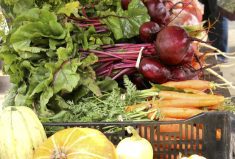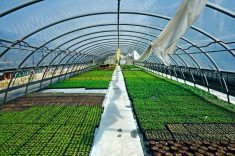British Columbia is a unique place in the world.
The variety of food grown is astounding as is the diversity among its processed products. The landscape is home to tiny farms and large ranches, local processors and those who export worldwide. This is a province of mountains, islands, rivers, ocean, lakes, ports and flyways, valleys and plains.
The romantic pull of farming for the lifestyle and the beauty of B.C. lures young folks, just as they are captivated by the lifestyle of riding the ranges in Alberta or working the spacious plains of Saskatchewan, exploring the diversity of Manitoba, milking cows in the East or harvesting the vegetable patch in the Atlantic. However, looking at the production of food through the lifestyle lens does not ensure success.
Read Also

Planting the seeds for a million-dollar retirement
Young farmers can build wealth by following these four steps from a financial advisor to manage risk and plan succession.
Rural life is not a fairy tale. Agriculture everywhere has its struggles. Climate events, market prices and disruptions, labour shortages, evolving regulations, choke points in infrastructure, and exhaustion are part of the reality, regardless of the landscape.
It’s a tough gig, farming.
You do have to love it — but you’ll love it a lot more if it provides a living wage for the proprietors and the employees. You’ll like it a lot more if it gives you the headspace, often taken up by worry, to create and innovate in your own business. You’ll enjoy it a lot more if your farm contributes to building a resilient community.
As we seek sound business opportunities that will be foundational to the long-term prosperity of the farm and ranch, regardless of the location, size or scope, it is important to understand the finances of that business. The lack of financial literacy is crippling to startups and ensures a slow bleed on established enterprises.
When the young couple bought the farm, they had stars in their eyes and big plans of feeding the community. There would be a variety of animals and steady traffic to the farm stand. They were new to farming but willing learners on the ‘how to’ run a little farm and readily accepted advice and quickly implemented it. When it came to the business plan however, they refused to discuss it, claiming it would ‘all work out.’
What was uncovered in the process of a continuing conversation with these new farmers was this simple fact: They were not familiar with common business terms.
It was not that they did not desire a financial plan or were against a business plan — they just did not want to expose the fact that they did not understand the language within it.
This conversation brought to light one of the greatest challenges in agriculture today and that is the lack of financial literacy within the demographic of farming and food production. No matter how great the industry — regardless of the diversification and the opportunity — the success of the farmer or rancher is highly (if not wholly) dependent on their financial acumen. Financial literacy is to business what data is to research.
The children who were in primary school were given a loan, with interest, to purchase laying hens, feed and the wood to build the chicken coop. The first year they paid off the loan and the interest and by year two were able to cash flow any operational expenses. Fast-forward five years and these children now own and sell a variety of poultry and poultry products and have established a small cow herd with their earnings. These young entrepreneurs run the enterprise based on the financials. The resiliency they build in their business will help them weather future production or financial storms.
Watching equity erode or getting to the point of insolvency is stressful and life changing. Many of the farmers who have faced this admit they did not understand the financial terms or covenants and they were too embarrassed to ask.
Rather they hoped, instead of planned, for a better year. Often a farm in trouble today is a farm that was in trouble yesterday. The owner simply did not have a full appreciation of the gravity of the compounding issues nor expect such a terminal outcome.
It is never too late to learn.
Children, youth, young adults and mature farmers are welcome to reach out. There are experts and resources in all areas of Canada that welcome the conversation.
We don’t wish to see our children, parents or neighbour fail. The sooner we ask for clarity, the quicker we may be able to get back on track. The sooner we advocate for financial literacy as part of the curriculum from kindergarten forward, the greater the chance of resilient businesses in our communities.
We need financial literacy in schools, clubs, communities and homes for the next generation of farmers to succeed to the point where they are secure enough in business to afford and enjoy the desired lifestyle of the farm.
The farm is not a legacy. It is the people in it who are. It is those people who build the future by nurturing business acumen in our youth and new entrants — and ignite all that is possible in the diverse and exciting profession of farming.
















